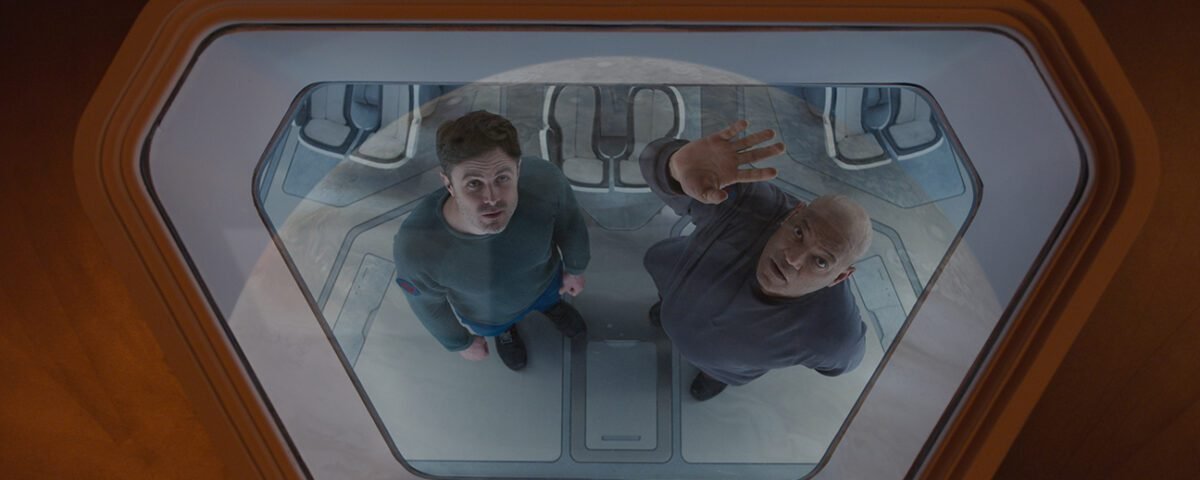


‘I’ll Be Right There’ Review: Edie Falco Leads a Wry Comedy as the Wise and Weary Heart of a Family
August 27, 2024


‘Beetlejuice Beetlejuice’ Review: Winona Ryder and Michael Keaton Help Tim Burton Rediscover the Ghoulish Mischief of His Glory Days
August 29, 2024Laurence Fishburne and Emily Beecham co-star in director Mikael Håfström’s story of three spacemen on a dangerous mission to the far side of the solar system.
Slingshot
More psy-fi than sci-fi.
“In space, no one can hear you scream… your girlfriend’s name,” would be a good tagline for Slingshot, a psychological sci-fi thriller about an astronaut suffering major romantic withdrawal during a voyage to Saturn’s largest moon, Titan.
Affleck stars as John, who’s part of a three-man mission on the Odyssey 1 (shoutout to Kubrick), a long-haul shuttle traveling to Titan to determine whether the moon’s ample supply of methane gas could help combat the climate crisis. If this doesn’t seem logical or even feasible, just know that Slingshot is less concerned with the reality of interstellar travel, or with what could actually be done with all that methane, than with John’s diminishing psychological state as he journeys further into the solar system.
Things get quickly out of hand when John’s fellow travelers, the bossy Captain Franks (Laurence Fishburne) and the jittery co-pilot Nash (Tomer Capone), begin fighting amongst themselves after the ship suffers damage during the flight. Nash is worried whether the titular “slingshot” maneuver — for an explanation of how this works, see the Nolan film — will kill them all, instead of propelling them from Jupiter to Saturn. But Franks is all about completing the mission despite the risks involved.
It’s fairly boilerplate material, and Håfström frankly seems more interested in exploring John’s memories, nightmares, visions and wavering psyche. Like in his Stephen King adaptation, 1408, about a man who goes crazy in a hotel room, the director has a knack for placing unreliable narrators in tight spaces that ultimately spell their doom. If you put aside all the space stuff, Slingshot is basically a one-set, one-character thriller that constantly tests the viewer’s belief in what’s happening.
Is John heartbroken because he left Zoe back on Earth for a multiyear trek to the far side of Saturn, or is he too emotionally withdrawn to care? Is Nash trying to sabotage the mission because he’s also completely unstable, or is he fighting to save their lives? And why is Franks suddenly brandishing a pistol to try and restore order on the ship? Even better question: Who brings a pistol onto a space shuttle?
It’s enough to keep the viewer guessing until the very last shot, and even beyond that. But it’s also thin ice to stand on. If nothing is real, then why should we care if everyone on Odyssey 1 dies or not? And if Slingshot isn’t, in the end, the story of a shattered romance, what is it really about? At its best, the film manages to capture the forlornness and desperation John experiences on his long, strange trip, and Affleck does a good job conveying that tone as he keeps waking up and going to sleep, over and over.
Fishburne and Capone (a solid actor who should be in more movies) are also strong, even if their characters aren’t given ample room to exist outside John’s interior conflicts. Indeed, there’s something altogether claustrophobic about Slingshot, including a shuttle (designed by Barry Chusid, San Andreas) whose interior seems to be a scaled-down version of the one from 2001: A Space Odyssey. What’s missing, finally, is the sense of vastness and fascination such a voyage usually entails. For all the millions of miles he supposedly travels, John never gets out of his own head, and neither do we.





